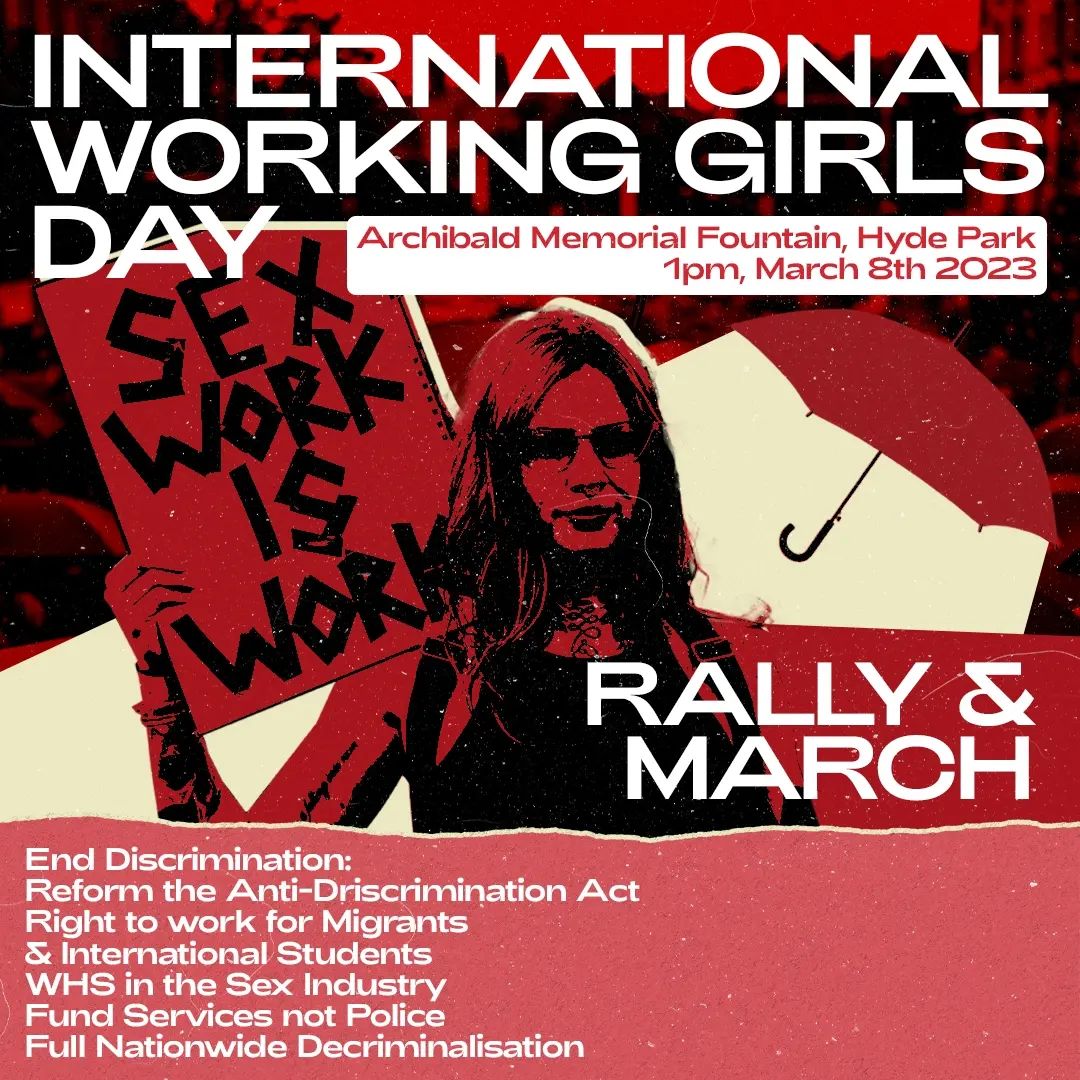Sex workers and their supporters will rally in Sydney tomorrow, Wednesday 8 March, on International Women’s Day. The protest, organised by a grassroots collective of sex workers explicitly calling for a sex workers’ union, has 5 demands for improving working conditions in the sex industry: 1) full decriminalisation nationwide; 2) fund services, not police; 3) work rights for migrants and international students; 4) better WH&S policies in the industry, and; 5) include sex work in the Anti-Discrimination Act (ADA).
Sex work in Australia is only partially decriminalised, with a patchwork of legislation across the different states and territories making some forms of sex work legally dubious or unsafe. The call for decriminalisation nationwide aims to eliminate the legal uncertainties faced by sex workers in different parts of the country and to resist legalisation efforts which purport to benefit sex workers, but actually force workers underground, into unsafe conditions or expose them to harassment and assault by the police. When sex work is decriminalised, workers are liberated from the violence perpetrated by the police and state. This is opposed to legalisation, which creates legal and illegal categories of sex work, and therefore invites further police intervention in the industry. For example, in Queensland, it is illegal for 2 or more sex workers to work from home or a hotel if it is not a licensed brothel, which only forces those workers unable to work in licensed brothels underground and into unsafe work.
Full decriminalisation is linked to the demand for funding sex worker services, rather than the police. Police have long made sex work unsafe, perpetrating violence and coercion against workers. A specialised sex work taskforce to the already overfunded NSW Police ($5.5 billion investment between 2022-23) would be harmful to sex workers, but well-funded, peer-led counselling and housing services for sex workers would be very useful. This demand also means funding services available to the general public, like medicare and Centrelink, upon which some sex workers (employed or not) rely due to the precarious nature of their work.
For migrants and international students, without a legal right to work, the worker is in a precarious position and far less able to confront their boss about workplace safety issues, pay, and even to access basic care in the event of a workplace incident. In addition to being a target of police, an assaulted migrant worker who legally cannot work in the industry cannot access even the minimal protection afforded to Australian workers. This is true for any industry, but it is especially pertinent for sex workers, whose job can be one of the most unsafe, and many of whom are migrants.
Sex workers are also demanding that their jobs be included in the ADA, which would give them the most basic legal protections against common forms of discrimination. At the moment, a sex worker could be fired from their second job on the grounds of doing sex work, have their bank account frozen, or evicted from their house, purely on the discriminatory whim of their landlord. Lacking these basic legal protections makes a sex worker’s life even more precarious than it already can be, purely due to their mode of employment.
Further, while (legal) sex workers are technically covered by basic Work Health and Safety (WH&S) laws, the legal precarity of the industry means WH&S policies are almost never heeded in practice. For example, there are operating brothels that refuse to supply protective equipment such as condoms to workers and even charge workers to access them, even though they are fundamental to workers’ safety.
With such demands, this rally represents a vital step towards sex workers taking the conditions of their industry into their own hands. Rather than centre on government oversight or better bosses, these demands are purely worker-focused and they correctly identify workers’ power as the best way to secure better conditions at work. It is no coincidence that this rally will be held on International Women’s Day. The rally’s title, International Working Girls’ Day, not only references the sex industry but also takes back International Women’s Day to its working class, socialist origins. The holiday, which began in various forms in Europe and America in the early 20th century, protested inflation and militarism and called for economic equality for women in its various iterations until the 60s, after which liberal influences made it the brunches and celebrations of women CEOs that it mostly is today. By reclaiming that working class history, this rally addresses the very real concerns of women workers in an industry where cultural conservatism, economic exploitation, and government legislation all conspire to maintain unacceptable working conditions.
All workers, no matter in what industry, deserve safe and secure work. It is through the collective will of the workers that we can fight and guarantee these goals. For further information about the rally and campaign, follow their Instagram page.
